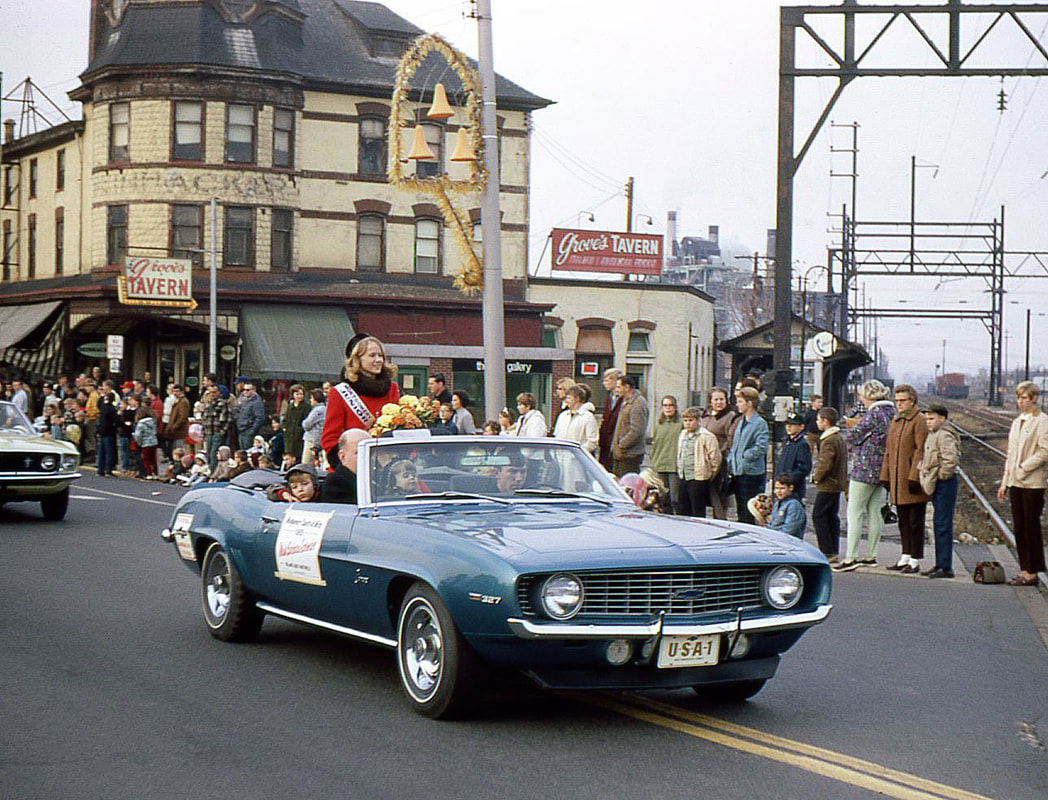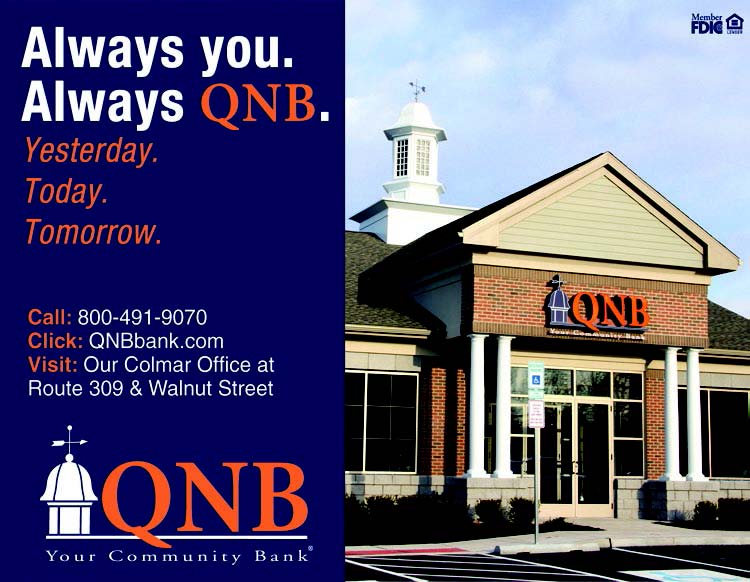DISCOVER LANSDALE MARDI GRAS: How a town misnamed a parade
(Lansdale's Mardi Gras returns to celebrate its 72st anniversary on Saturday, Nov. 18, 2023. Check back for registration information.)
A version of this story appeared in a previous issue of Discover Lansdale Magazine.
By Dick Shearer, Historian, Lansdale Historical Society
Leave it to our beloved Lansdale to provide citizens present and future with a real head-scratcher.
How did we wind up with a winter holiday parade named “Mardi Gras”? Yeah, Mardi Gras as in New Orleans’ centuries-old pre-Lenten celebration. Mardi Gras, which translated from French, means “Fat Tuesday.”
We have to travel back to 1950, when our nation was basking in post-World War II prosperity and Lansdale was the center of the region’s retail business. Main Street, Broad Street and the other adjacent roads were the go-to places to shop. So brisk was business that merchants waited anxiously for a new municipal parking lot to accommodate all the customers who were driving downtown.
The Christmas season was always the high point of the sales year, and stores here would celebrate with strings of lights across the streets, special sales, gift-tempting window displays and appearances by Santa in some of the businesses. To nudge the buying urge a bit more, the Lansdale Chamber of Commerce and the Jaycees came up with the idea of a big community parade to kick off the holiday season and officially invite Santa back to town.
As legend has it, the parade’s steering committee wanted to stir up interest for this new event by holding a name-the-parade contest, and residents were invited to submit entries. But as it turned out, the pickings were slim and it was agreed “Mardi Gras” was the best of a bad lot. As the story goes, no one was crazy about the choice but the committee decided to use it in 1950 and try to come up with something more appropriate in 1951.
As we know now – 70+ years later – nothing better came along.
As far as the parade was concerned, it was an overwhelming success – far beyond the Chamber’s expectations. More than 15,000 spectators turned out on a cold Thursday night (Nov. 30) to witness the start of this annual tradition. More than 2,000 marchers including seven musical organizations participated, and 22 floats were entered.
It should be noted that in the early years the parade moved east to west on Main Street from Line Street to Cannon Avenue, the opposite of today. More than $1,200 in prize money was distributed to participating organizations. Among the winners were the Lansdale High School Band (Musical Division), the Hatfield Lions Club (Best Float), and York Avenue School (Best Group Entry).
Of course, the purpose of the parade was to welcome in the holiday season, so all eyes were searching for Santa. To announce his approach, the lights on the community Christmas tree were turned on at 7:40 p.m. as the jolly old man stepped off a Reading commuter train into a screaming crowd of delighted children. Then he was officially welcomed to town by Burgess (Mayor) E.K. Bean.
As a result of that successful beginning, the Mardi Gras evolved into an annual tradition that attracted participants and spectators from throughout the Bux-Mont area. During the 1950s-70s, the parade drew as many as 25,000 onlookers and lasted for many hours. In 1965 – after more than a few frostbitten noses – the parade was moved from Thursday evenings to Saturday afternoons.
So today what we have is a seven-decades-old community tradition named the Mardi Gras (Fat Tuesday) Parade. It has nothing to do with the pending arrival of Lent, nor was it ever held on a Tuesday. But gosh darn it, this is OUR parade and we’ll call it what we want.
A version of this story appeared in a previous issue of Discover Lansdale Magazine.
By Dick Shearer, Historian, Lansdale Historical Society
Leave it to our beloved Lansdale to provide citizens present and future with a real head-scratcher.
How did we wind up with a winter holiday parade named “Mardi Gras”? Yeah, Mardi Gras as in New Orleans’ centuries-old pre-Lenten celebration. Mardi Gras, which translated from French, means “Fat Tuesday.”
We have to travel back to 1950, when our nation was basking in post-World War II prosperity and Lansdale was the center of the region’s retail business. Main Street, Broad Street and the other adjacent roads were the go-to places to shop. So brisk was business that merchants waited anxiously for a new municipal parking lot to accommodate all the customers who were driving downtown.
The Christmas season was always the high point of the sales year, and stores here would celebrate with strings of lights across the streets, special sales, gift-tempting window displays and appearances by Santa in some of the businesses. To nudge the buying urge a bit more, the Lansdale Chamber of Commerce and the Jaycees came up with the idea of a big community parade to kick off the holiday season and officially invite Santa back to town.
As legend has it, the parade’s steering committee wanted to stir up interest for this new event by holding a name-the-parade contest, and residents were invited to submit entries. But as it turned out, the pickings were slim and it was agreed “Mardi Gras” was the best of a bad lot. As the story goes, no one was crazy about the choice but the committee decided to use it in 1950 and try to come up with something more appropriate in 1951.
As we know now – 70+ years later – nothing better came along.
As far as the parade was concerned, it was an overwhelming success – far beyond the Chamber’s expectations. More than 15,000 spectators turned out on a cold Thursday night (Nov. 30) to witness the start of this annual tradition. More than 2,000 marchers including seven musical organizations participated, and 22 floats were entered.
It should be noted that in the early years the parade moved east to west on Main Street from Line Street to Cannon Avenue, the opposite of today. More than $1,200 in prize money was distributed to participating organizations. Among the winners were the Lansdale High School Band (Musical Division), the Hatfield Lions Club (Best Float), and York Avenue School (Best Group Entry).
Of course, the purpose of the parade was to welcome in the holiday season, so all eyes were searching for Santa. To announce his approach, the lights on the community Christmas tree were turned on at 7:40 p.m. as the jolly old man stepped off a Reading commuter train into a screaming crowd of delighted children. Then he was officially welcomed to town by Burgess (Mayor) E.K. Bean.
As a result of that successful beginning, the Mardi Gras evolved into an annual tradition that attracted participants and spectators from throughout the Bux-Mont area. During the 1950s-70s, the parade drew as many as 25,000 onlookers and lasted for many hours. In 1965 – after more than a few frostbitten noses – the parade was moved from Thursday evenings to Saturday afternoons.
So today what we have is a seven-decades-old community tradition named the Mardi Gras (Fat Tuesday) Parade. It has nothing to do with the pending arrival of Lent, nor was it ever held on a Tuesday. But gosh darn it, this is OUR parade and we’ll call it what we want.




